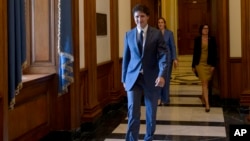Canadian Prime Minister Justin Trudeau can expect some tough questions at this week's NATO summit in Washington over his nation's failure to meet an agreed defense spending target equaling 2% of GDP.
One of the alliance's 12 founding members, Canada has become one its lowest-spending members, even as several others have boosted spending in the face of U.S. pressure and the growing threat posed by Russia in Europe.
Despite joining in a 2014 pledge to boost spending to the 2% target, the nation currently spends just 1.34%, better than only five other alliance members. In April, it announced plans to increase that to 1.76% by the 2029-30 budget year.
The Washington Post reported later that month that Canada has provided Ukraine with more than $1 billion of military aid since Russia's full-scale invasion in February 2022 and that it has trained more than 36,000 Ukrainian military and security personnel since 2015.
But, The Post said, citing a leaked document, Trudeau has told his NATO colleagues that Canada will never reach the 2% spending target.
"Canada has been dodging its commitment to NATO for a decade," writes Paul McLeary in Politico this week. "It may not be able to hold out for much longer. … The alliance as a whole might have been slow to get there, but this year, 23 of the 32 NATO members will hit the mark as fears grow along the alliance's eastern front over [Russian President Vladimir] Putin's plans."
Anticipating sharp criticism at the summit, Canada has said it soon plans to share a "credible, verifiable" plan to meet its spending commitments.
That follows a bipartisan letter from the U.S. Senate in May in which Canada was urged to come to the summit with just such a plan.
Rob Huebert is a top Canadian defense expert and currently teaches at the University of Calgary.
"The fact that you had both Republicans and Democrats offering a bipartisan letter of warning to Canada can't be underplayed," Huebert told VOA in a phone interview. "When's the last time you heard of the Senate having any bipartisan agreement?
"We are in very dangerous times," Huebert said. "We need to ensure that North America is secure. We do that by ensuring that the NATO alliance is secure. There is no sugarcoating the rising risk of war that is coming, and hopefully our political leadership will come to understand that in Canada."
Phil Gurski, a former Canadian intelligence officer, told VOA, "There is a big gap between what [Trudeau government officials] say they're going to do and what they actually do."
"They make these grand announcements, and nobody's monitoring it, nobody cares, and nothing really happens at the end of the day," Gurski said in a phone interview.
U.S. commentators agree that Canada needs to do more.
"Canada has long been one of America's most dependable allies and a stalwart of democratic norms globally," said Bishop Garrison, a senior fellow and adjunct professor at the National Security Institute at George Mason Law near Washington.
"However, economic support of NATO is crucial," he said in an interview. "Given the continued threat of Russian aggression in the region it is key that all NATO members remain unified by fulfilling their obligations. Canada can and must meet the moment and continue their storied tradition as an international community leader."




